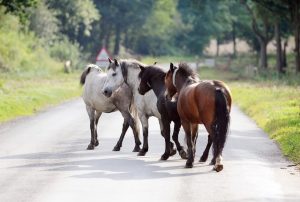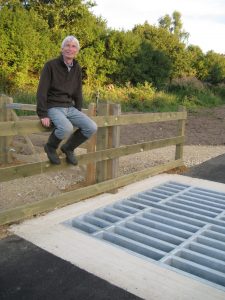Support us from £3/month
We deal with almost 1000 cases a year assisting communities, groups and individuals in protecting their local spaces and paths in all parts of England and Wales. Can you help us by joining as a member?
We are calling for better protection for the unique common land of England and Wales. Our general secretary, Kate Ashbrook, spoke at a conference held at Newcastle University, Sustaining the Commons, on 5 July.

Dartmoor ponies on Litcham Common, Norfolk. Photo: Matthew Usher.
Said Kate: ‘While the term”‘common” is understood internationally to mean “shared resource”—whether land, sea, the air or even information—here in England and Wales we have the first, historic, commons. These are the survivors of the Inclosure Movement, they are defined in law and are unique.
‘Here, a common is land which has an owner but on which others have rights of grazing, or collecting wood, and the public has the right to walk on all of them and to ride on many.
‘Our commons have some protection in law, but they are being eroded by nibbling development and by neighbours filching bits for their gardens. No one has a duty to act and the buck is passed.
‘Many suffer from lack of management which means they get lost under a sea of scrub. Or people want to fence them to protect grazing stock from speeding traffic. There are many dilemmas facing our commons.
‘We want to see communities being central to plans for managing the commons. Many local people have grown up with the common, they act as a watchdog and know what’s going on there. Managers of commons need to consult and involve the community in their plans for the common.
‘Unfortunately, the registers of commons, drawn up in the 1970s, are inaccurate and out of date. The Westminster government passed legislation seven years ago (part 1 of the Commons Act 2006) to enable the registers to be updated, but it has still only implemented it in seven English counties and not at all in Wales. There is much common land which was omitted during the original, short, registration period and which should be included on the registers, giving the public rights of access there.
‘We want there to be a duty on local authorities to take enforcement action against unlawful encroachments on commons.

Litcham Common, Norfolk, where cattle-grids have been installed and the traffic is slowed, enabling fencing to be removed. Photo: Tim Angell.
‘We should also like to see a universal speed-limit of 40mph on unfenced roads across commons, as exists on Dartmoor and in the New Forest. We believe that drivers should respect the commons and slow down.
‘So here is our five-point plan to improve the lot of commons:
- Governments to implement part 1 of the Commons Act 2006, to enable the common-land registers to be updated.
- Local authorities to have a duty to take action against unlawful works on commons, as they do for obstructions on public paths.
- A 40-mph speed limit on all unfenced roads across commons, to protect the livestock and the landscape.
- True recognition by Westminster and Welsh governments of the multi-value of common land, so that all policies take account of commons.
- Common-land managers always to involve the community in their plans for the common.’
